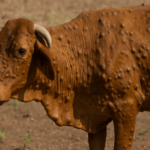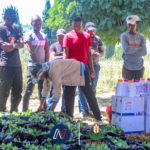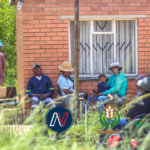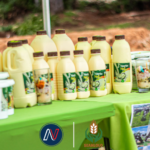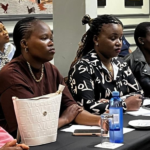The morning sun stretched across the Matelile hills on October 8th, casting a golden glow over a gathering that was more than a celebration but a testament to vision, discipline and faith.
Farmers, community leaders and agricultural officers converged in Mafeteng to honour Beleme Lebajoa, a dedicated wool and ram breeder who had reached a remarkable milestone: completing the fourth and final phase of the Smallholder Agricultural Development Project II (SADP II).
For Lebajoe, the founder of Matelile Agribusiness, the moment marked the culmination of five years of persistence, sleepless nights and steady learning.
From his humble beginnings with a handful of sheep and juggling being a police offer, to becoming one of Lesotho’s most promising Merino breeders, his story mirrors the resilience of Basotho farmers who continue to thrive despite climate pressures, disease outbreaks and market challenges.
Raised in the village of Ha Seeiso, Matelile, Lebajoe always knew his heart belonged to farming.
By day, he serves in the Lesotho Mounted Police Service (LMPS) in Maseru; by night and on weekends, he tends to his flock in the rural heartland where he was born.
“As a boy, I always knew that I would one day have a flock with my mark on them,” he says proudly.
“Now I do.”
His journey began in 2019 with just ten auctioned sheep. They were not of the highest quality, but he nurtured them patiently to potential.
“My flock was not excellent nor poor—it was just satisfactory, but I knew I could do better.”
By 2022, through careful breeding and improved management, his flock had grown to 112 sheep, a testament to his discipline and understanding of animal husbandry.
Lebajoa’s breakthrough came when agricultural extension officers introduced him to the Smallholder Agricultural Development Project II, a World Bank-funded initiative under the Ministry of Agriculture, Food Security and Nutrition.
Encouraged by the officers, he applied in 2020. The process was demanding: applicants had to demonstrate commitment and raise 25 percent of their project funding, while SADP II covered the remaining 75 percent.
“I had to sell my flock to meet the terms of the grant. It wasn’t easy, but I believed in what I was building.”
His perseverance paid off.
Matelile Agribusiness was awarded M400, 000, which transformed his farm’s operations.
The first phase of the grant provided a borehole water system, kraal structure and 40 genetically improved ewes along with two rams.
Today, the farm stands proudly with over 60 high-quality Merino sheep, managed by a growing team of local workers.
“I produce my own feed mainly maize and grain for my sheep and the community and that that has been my secret to consistent quality.”
At the celebration in Matelile, SADP II officers hailed the farmer as a model of excellence.
Ana Seke, Project Facilitation Officer for SADP II, described him as “a farmer who demonstrates that commitment and accountability yield results.”
She noted that Lebajoe is the first farmer to complete the fourth and final phase of the SADP II grant scheme.
“In this second round of the programme, we had 22 beneficiaries and Matelile Agribusiness is the first to reach the finish line. His success should inspire others still on their journey,” she said.
Lebajoa’s discipline and transparency have made him a trusted example in the farming community.
His meticulous record-keeping, adherence to timelines and investment of profits into new ventures, including grain production, have solidified his position as a true agripreneur.
The Lesotho National Wool and Mohair Growers Association (LNWMGA) Chairperson, Mokoenihi Thinyane, praised the farmer’s work as crucial in building national resilience in Merino breeding.
“The closure of borders due to the blue tongue outbreak in South Africa created a shortage of breeding stock however, farmers like Lebajoa are bridging that gap. His rams and ewes are of such quality that they now serve as a domestic source of improved genes.”
Thinyane further reflected on how Lesotho’s wool and mohair sector has evolved, saying; “Our farmers today are professionals. Men and women who earn respectable incomes. Farming is no longer associated with poverty. People like Lebajoa represent that change.”
He noted that the calibre of farmers in the country has evolved over the years and that the wool and mohair sector has transformed into an industry that supports families and uplifts communities.
Speaking at the event, SADP II field officer, Relebohile Khathibe, explained that the broader goal of the programme is to transform smallholder farmers into commercial, tax-paying enterprises.
“The aim is to make agribusiness a key part of Lesotho’s formal economy. We expect each beneficiary to create jobs, build community capacity and operate transparently.”
He noted that Matelile Agribusiness now employs several workers, helping fight unemployment in Mafeteng.
“Every successful farmer means jobs created, and every job means food on a table. That is the ripple effect of this project,” Khathibe said.
He stressed that SADP II encourages farmers to diversify.
“As long as investments remain within the agricultural value chain, expansion is welcome. That’s how small farms evolve into enterprises that pay taxes and sustain communities.”
Khathibe noted that many beneficiaries struggle to progress beyond the first or second phases due to financial or management challenges.
“What sets Lebajoa apart is his humility and discipline,” Khathibe added noting working with him was easy.
“…he is proof that progress follows patience.”
He also recalled Matelile Agribusiness’ success in the National Small Stock Show earned him national attention.
“After his victory, the Minister of Agriculture publicly pledged to buy him a ram worth M30,000 through SADP II, that shows how much confidence the leadership has in him,” Khathibe recalled.
Running a wool and mohair enterprise in Lesotho is not without obstacles. Climate change, disease outbreaks and costly feed are constant threats, but Lebajoa has found strength in self-reliance.
“My turning point was learning that producing my own feed keeps my sheep healthy and my costs low,” he explained.
As a registered block farmer, he cultivates maize and grains to feed both his animals and his community.
“I never run out of food. In fact, I produce extra for my neighbours.”
“With visible agribusinesses like mine, young people can see that hard work pays. They don’t have to leave home or choose crime. They can build something,” he said, hoping that the government continues to invest in breeding programs and disease management to reduce reliance on imported stock.
“Blue tongue is a serious issue that sees many farmers lose good animals because they don’t know which vaccines to use or when. We need more education on that.”
“I am grateful that SADP II fast-tracked my dream, but what keeps me going is the desire to see Mafeteng become a hub for quality wool and mohair production. If we keep improving and breeding locally, we can reduce imports and build our own legacy.”

